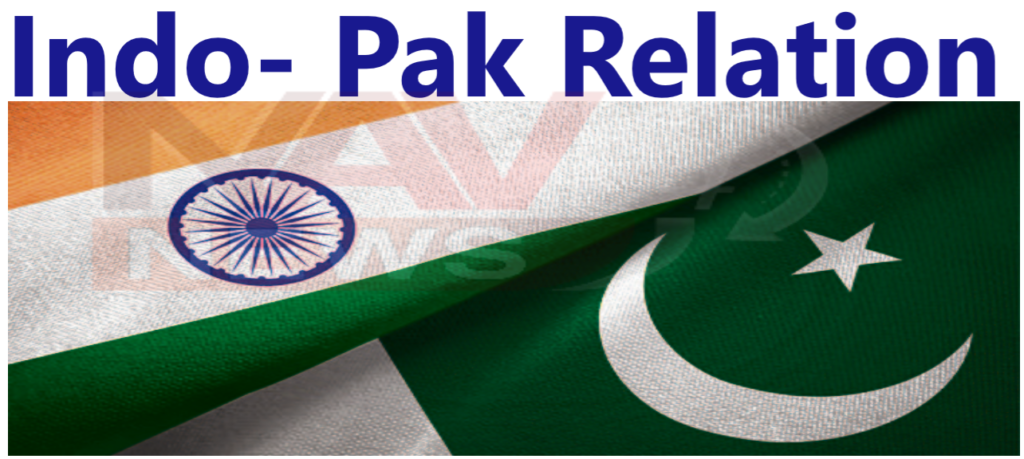
In February 2021, India and Pakistan issued a joint statement for the first time in years, announcing that they would observe the 2003 ceasefire along the Line of Control (LoC). The countries have agreed to a strict observance of all agreements, understandings and cease firing along the Line of Control (LoC) and all other sectors with effect from the midnight of February 24-25, 2021. In the interest of achieving mutually beneficial and sustainable peace along the borders, the two Directors General of Military Operations agreed to address each other’s core issues and concerns which have the propensity to disturb peace and lead to violence.
- In the latest bilateral brief between India and Pakistan (February 2020) India stands by its “Neighbourhood First Policy” and desires normal relations with Pakistan in an environment which is free of terror and violence.
- In 2019, Article 370 of India’s Constitution, was scrapped off, which gave a special status to Jammu and Kashmir. Following which, the bilateral relations faced a severe blow. It was followed by Pakistan expelling the Indian Hgh Commissioner in Islamabad and suspension of air and land links, and trade and railway services.
- There was no forward movement in bilateral ties in 2020 due to the mistrust between the two countries, especially on the Kashmir issue.
- India, on February 15, 2019, withdrew Most Favoured Nation Status to Pakistan
A Brief Background of India-Pakistan Relations
Ever since India’s independence and the partition of the two countries, India and Pakistan have had sour relations. Discussed below is a brief timeline of the relations between the two countries:
- The Composite Dialogue between India and Pakistan from 2004 to 2008 addressed all outstanding issues. It had completed four rounds and the fifth round was in progress when it was paused in the wake of the Mumbai terrorist attack in November 2008.
- Then again in April 2010, then Prime Minister Manmohan Singh and Pakistani PM Yousuf Raza Gillani on the margins of the SAARC Summit, spoke about the willingness to resolve the issue and resume the bilateral dialogue.
- In 2011, after a meeting between the Foreign Ministers of both the countries, the bilateral ties were resumed on issues including:
- Counterterrorism & Humanitarian issues
- Economic issues at Commerce
- Tulbul Navigation Project at Water Resources Secretary-level
- Siachen at Defence Secretary-level
- Peace & Security including Confidence Building Measures (CBMs)
- Jammu & Kashmir
- Promotion of Friendly Exchanges at the level of the Foreign Secretaries.
- Cross LoC travel was started in 2005 and trade across J&K was initiated in 2009
- India and Pakistan signed a visa agreement in 2012 leading to liberalization of bilateral visa regimes between the two countries
Conflict Zones between India and Pakistan
There have been a few constant factors which have led to the complex bilateral ties between the two countries. Discussed below are these factors as per the latest developments released by the Government authorities, as of February 2020:
Cross-border Terrorism
- Terrorism emanating from territories under Pakistan’s control remains a core concern in bilateral relations
- India has consistently stressed the need for Pakistan to take credible, irreversible and verifiable action to end cross border terrorism against India
- Pakistan has yet not brought the perpetrators of Mumbai terror attacks 2008 to justice in the ongoing trials, even after all the evidence have been provided to them
- India has firmly stated that it will not tolerate and comprise on issues regarding the national security
- Based on attacks in India and involvement of the neighbouring country, the Indian Army had conducted surgical strike at various terrorist launch pads across the Line of Control, as an answer to the attack at the army camp in Uri, Jammu and Kashmir
- India had again hit back over the cross border terror attack on the convey of Indian security forces in Pulwama by carrying out a successful air strike at a training camp of JeM in Balakot, Pakistan
Cross border terrorism is one of the biggest factors for the disrupted relations between India and Pakistan.
Trade and Commerce
The figures for India Pakistan bilateral trade in the last 6 years is as follows:
| 2013-14 | 2014-15 | 2015-16 | 2016-17 | 2017-18 | 2018-19 | |
| Export | US$2.2bn | US$1.85bn | US$2.1bn | US$1.83bn | US$1.92bn | US$2.06bn |
| Import | US$0.426 bn | US$0.497bn | US$.441bn | US$.456bn | US$0.488bn | US$ 0.495 bn |
| Trade Balance | US$1.8bn | US$1.3bn | US$1.7bn | US$1.3bn | US$1.435bn | US$1.57 bn |
The trade agreement has also faced a downfall when it comes to the relations between India and Pakistan. In 2019, after the Pulwama terror attack, India hiked customs duty on exports from Pakistan to 200% and subsequently, Pakistan suspended bilateral trade with India on August 7, 2019.
There are two major routes via which trade is commenced between the two countries:
- Sea Route – Mumbai to Karachi
- Land Route – via Wagah Border through trucks
Indus Waters Treaty
The 115th meeting of Permanent Indus Commission (PIC) was held on August 29 and 30, 2018 in Lahore. The Indian delegation was led by the Indian Commissioner for Indus Water (ICIW), while the Pakistan delegation was led by Pakistan Commissioner of Indus Water (PCIW).
In the two days meeting both sides discussed Pakal Dul Hydroelectric Power Project (HEP), Lower Kalnai HEP and reciprocal tours of Inspection to both sides of the Indus basin. Subsequently, a delegation led by PCIW inspected Pakal Dul, Lower Kalnai, Ratle and other hydropower projects in the Chenab Basin between January 28 and 31, 2019.
Read in detail about the Indus Water Treaty at the linked article.
People to People Relations
- Since 2014, India has been successful in the repatriation of 2133 Indians from Pakistan’s custody (including fishermen), and still, about 275 Indians are believed to be in their custody
- In October 2017, the revival of Joint Judicial Committee was proposed by India and accepted by Pakistan, wherein, the humanitarian issues of custody of fishermen and prisoners, especially the ones who are mentally not sound in each other’s custody need to be followed
- The Bilateral Protocol on Visits to Religious Shrines was signed between the two countries in 1974. The protocol provides for three Hindu pilgrimage and four Sikh pilgrimage every year to visit 15 shrines in Pakistan while five Pakistan pilgrimage visit shrines in India.
Kartarpur Corridor
- An agreement between India and Pakistan for the facilitation of pilgrims to visit Gurdwara Darbar Sahib Kartarpur, Pakistan, was signed on 24 October 2019 in order to fulfil the long-standing demand of the pilgrims to have easy and smooth access to the holy Gurudwara
- The Kartarpur Sahib Corridor Agreement, inter alia, provides for visa-free travel of Indian pilgrims as well as Overseas Citizen of India (OCI) cardholders, from India to the holy Gurudwara in Pakistan on a daily basis, throughout the year.
- On November 9, 2019, on the occasion of the 550th birth anniversary of Guru Nanak Dev ji, Prime Minister Narendra Modi inaugurated the corridor

